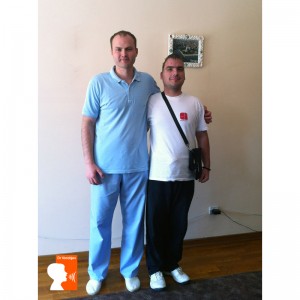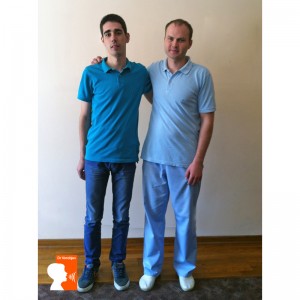 MILOŠ ERIĆ: “What I felt, but not right away, but after some time, for example two or three months later, is how I gradually lost restraints. That is something person without stuttering problem can’t even imagine. First period was all about fear: Will I start stuttering? It is always in the back of your mind. However, as the time passed and I experienced different situations without stuttering, I slowly started enjoying my speech and communication.”
MILOŠ ERIĆ: “What I felt, but not right away, but after some time, for example two or three months later, is how I gradually lost restraints. That is something person without stuttering problem can’t even imagine. First period was all about fear: Will I start stuttering? It is always in the back of your mind. However, as the time passed and I experienced different situations without stuttering, I slowly started enjoying my speech and communication.”
Dr Vorobiev / Interpreter Jelena: Good afternoon, today in our school of those who conquer stuttering our guest is Miloš Erić, who truly deserves to be in this school. He is not only our student, but a friend of mine, as well. He went through a therapy a few times and will speak about his experiences after first, second therapy and, in general, about challenges he faced. The most important thing he will talk about is how he developed his style of speaking (his way of speaking) and he will have a few advices for all those who are practicing – the things they should focus on and things they should ignore.
Miloš: My name is Miloš Erić and I am 34 years old, I live in Belgrade and I have had the stuttering problem since I was 9. I visited the clinic for the first time in 2011. Before that I had a period of a few years during which I had great difficulties speaking, with severe, pronounced stutter, which presented a great problem at work because my job requires verbal communication. After the first therapy there was a period of improvement, however about after a month or so, I stopped with those regular exercises which are necessary after the therapy, and after two months or so, there was a deterioration – I didn’t go back to my old stuttering speech, but more like a slight deterioration. After that I decided to go to another therapy during the next year.
This time I made a decision: I will not only be more persistent with exercises but also give a give my speech priority to other activities. I also decided to speak in the same way in every situation and to any person, even if it is some important, authoritative figure, I decided to follow certain rules which help fluent speech, that is, which prevent stuttering. After the second therapy, which was, I can freely say, even more important for my life, I was really persistent and dedicated to practice for the next 5 or 6 months and I followed certain rules I learned during the therapy in every situation, and there were some very stressful situations and conversations with very authoritative people from politics. What I felt, not immediately, but after some time, perhaps two or three months later, is how I gradually lost restraints.
That is something persons without stutter can’t even imagine. First period was all about fear: It is always in the back of your mind. However, as the time passes and I experienced different situations with out stuttering, I slowly started enjoying my speech and communication. It also helped me to get more relaxed over time and encourage myself to participate in harder speaking situations. So, among other things, I appeared alongside the doctor in live TV shows. Afterwards I held lectures from my area of expertise, I held lectures in the faculty and without any fear that I would start stuttering. After that period I still wasn’t able to completely relax, as it is said that the fear of public speaking for a person with stutter is more intense than the fear of death. This explains why it took me so much time to relax during speaking and stop thinking if I will stutter or not, and instead concentrate on what I was talking about, but once again, just to be safe, I went to the therapy to get that additional self-esteem
out stuttering, I slowly started enjoying my speech and communication. It also helped me to get more relaxed over time and encourage myself to participate in harder speaking situations. So, among other things, I appeared alongside the doctor in live TV shows. Afterwards I held lectures from my area of expertise, I held lectures in the faculty and without any fear that I would start stuttering. After that period I still wasn’t able to completely relax, as it is said that the fear of public speaking for a person with stutter is more intense than the fear of death. This explains why it took me so much time to relax during speaking and stop thinking if I will stutter or not, and instead concentrate on what I was talking about, but once again, just to be safe, I went to the therapy to get that additional self-esteem
My advice to people who plan to overcome stuttering – once and for all – is to be persistent in the first place. There are still situation in which, due to fatigue, various life circumstances, the stutter will appear again, even if you are regularly practicing, and simply put you should not fall on that obstacle and lose the motivation, but instead you should be persistent and perseverant as with the exercising. The second advice would be a small dose of selfishness (if I may say so). I mean, put yourself and your speech in first place, especially in the critical period of four months after the therapy. So, make this a priority and spent that hour a day, how much it takes to complete the practice, and do it, be fanatical and disciplined, instead of going out for a drink or to a birthday or letting some other activities become more important than these over time. These, in short, are my experiences, but I’m not sure if I forgot something important.
Dr Vorobiev / Interpreter Jelena: Miloš, the doctor has two more questions for you. First question: Is the life easier without stuttering? – although the doctor presumes he already knows the answer, and the other question is: Considering that the patients and groups are at different levels in terms of treatment successfulness, do you, being at your current stadium, get satisfaction from communication?
Miloš: As for the first question… it is not enough to say it is easier. There are no words in our language to describe it and, of course, people with stutter know what kind of social stigma it is, so, it is a fact that a man without stutter is: much more successful in life and has certain advantages or at very least, he is not denied of certain things. This is the same as if a crippled man would get a new limb, literally speaking. And as for the other question: Yes, maybe not immediately after the therapy, but as the time passed for the first time in my life I started enjoying speaking.
And one more thing I forgot to say, and which is in a way related to me being able to develop my own style of speaking. Before this I had a habit to, probably to avoid stuttering, say some words very quickly, which made me, and it’s a vicious cycle, stutter even more. Speaking slowly also helped me follow my train of thought, arrange my thoughts as I speak and in a way enjoy speaking. What’s interesting, since my job in a way includes teaching people, I noticed over time that this slower speech rate leaves a much better impression on the person I am addressing, it simple feels more serious and more pronounced than words spoken very quickly.
I could also add that it was the first feeling of that kind in my life, that kind of relief.  For example, in my high school years I had some great fears, even total blockades, not isolated but consecutive, I had to take written exams. The main concern when choosing a faculty was if exams are taken in writing, and simply, I never had that feeling of satisfaction during speaking and never felt confident enough to step in front of the small or large audience, before any authority without thinking about stutter, but instead being afraid of what I would say and how it would be received. I think that this is the best indicator that I’m on the right path, that I still have that small bit of doubt when I am tired and think to myself: Oh, will the fatigue make me stutter? But, that’s just a very small percent that will be lost with time.
For example, in my high school years I had some great fears, even total blockades, not isolated but consecutive, I had to take written exams. The main concern when choosing a faculty was if exams are taken in writing, and simply, I never had that feeling of satisfaction during speaking and never felt confident enough to step in front of the small or large audience, before any authority without thinking about stutter, but instead being afraid of what I would say and how it would be received. I think that this is the best indicator that I’m on the right path, that I still have that small bit of doubt when I am tired and think to myself: Oh, will the fatigue make me stutter? But, that’s just a very small percent that will be lost with time.
Dr Vorobiev / Interpreter Jelena: Did the doctor understand you correctly: You don’t think about stuttering anymore?
Miloš: Yes, very rarely, only when I’m tired, then I need a bit more control, I start talking slower. But I stopped focusing on stutter in ordinary communication, and instead I focus on things I want to say.
Dr Vorobiev / Interpreter Jelena: So, you are now on the higher level because you get satisfaction, the next level is to forget you ever stuttered and more often you forget, it becomes more natural, becomes more real. So I have two advices for you to follow in the future period, two exercises. First is to not let any new people you meet notice that you have ever had the problem and speak perfectly. And the other one is to make people who knew about your problem, which you knew from before, to forget about it.
Miloš: All I have left is to once more thank the doctor, “thank you” is not enough for what you did, but my life now is, maybe due to circumstances and not only the way I speak, but mostly because of it, changed for better, and nothing of this would have happened if I hadn’t decided to come here in 2011.
Dr Vorobiev / Interpreter Jelena: Once more the doctor would like to say that he is no longer a doctor, he is a teacher, but with medical education, and furthermore, someone who once also had a problem with stutter. So, him being a teacher too, he couldn’t cure you, help you or teach you if you haven’t had the proper desire and motivation. For example, our cameraman Nikola, didn’t know that the doctor had stuttering problem. They didn’t know each other, they didn’t go to school together, they didn’t know each other at the time the doctor had had the stuttering problem. The doctor will make an effort to speak perfectly, so that Nikola would never find out that he had ever had the problem. If asked: Doctor, did you ever have stuttering problem?, the doctor will answer: “No, I never had a stuttering problem.”. Yes, of course he did, but he gives a negative response, because in such way he tries to forget about his problem. That was even harder thing to do, admitting that you had a stuttering problem, than speaking without stuttering.
































































































































































 Dr Vasily Vorobiev will visit Belgrade in July 2018. First day of consultations will be held on 5.07.2018 at 17:00. Group therapy will start on 6.07.2018 till 12.07.2018
Sign up
Dr Vasily Vorobiev will visit Belgrade in July 2018. First day of consultations will be held on 5.07.2018 at 17:00. Group therapy will start on 6.07.2018 till 12.07.2018
Sign up  Dr Vasily Vorobiev faced stuttering in his early childhood. Trauma of a dog bite caused severe speech problems he had to struggle until he was 18. When he realized that standard speech disorder therapies have no effect, he decided to use the knowledge of psychologists and psychiatrists available at the time and its own experience with stuttering to create complex system of exercises today known as the Vorobiev method. This method now helps people from Serbia, Croatia, Bosnia and Herzegovina, Montenegro, Macedonia, Russia, Austria, Switzerland, Israel and USA to overcome speech problems once and for all.
Dr Vasily Vorobiev faced stuttering in his early childhood. Trauma of a dog bite caused severe speech problems he had to struggle until he was 18. When he realized that standard speech disorder therapies have no effect, he decided to use the knowledge of psychologists and psychiatrists available at the time and its own experience with stuttering to create complex system of exercises today known as the Vorobiev method. This method now helps people from Serbia, Croatia, Bosnia and Herzegovina, Montenegro, Macedonia, Russia, Austria, Switzerland, Israel and USA to overcome speech problems once and for all.